The Ted Lasso Relationship Guide: Thank you mom, and also...
Can we pass on more than misery to the people we love?
Note: I don’t usually use a lot of profanity in my writing, but I don’t think there’s any way to talk about this week’s episode without it. And I don’t like to censor my writing because we’re all grownups who know what the word is. Sorry, Phoebe.
Y’all. How is it possible that next week we will (likely) be seeing the last episode of Ted Lasso? Almost certainly the last with the titular character, given the truth bomb cliffhanger and the gorgeous cover of “Home” by Brandi Carlile that played over the end credits, but from everything I have read, it really does seem like the next episode will be the last.
They really are packing a lot into these final episodes. The ongoing tension between Roy and Keeley. The whole story with Jamie and his mom. That incredible scene between Beard and Nate. Ted’s incredibly bad take that somehow Sleepless in Seattle is a better movie than You’ve Got Mail. I considered writing about all of them.
But of course, I had to write about Ted and his mom, Dottie. As Ted told us back in season 2, “I love meeting people’s moms. It’s like reading an instruction manual on why they’re nuts.” Dottie Lasso definitely gives us some pretty good insight into Ted’s neuroses.
Right from the jump, Ted seems incredibly uncomfortable around his mother. He is easily exasperated by her cheery nature and is quick to correct the way that she embellishes stories from his youth.
But we see a lot of passive-aggressive behavior from Dottie as well. The insistence that she sleep on the couch instead of the bed. The decision to stay at Ted’s house rather than go to the game with him and then texting him her regret. Coming to London without letting him know ahead of time. Nothing blatantly terrible, but the kind of behavior we have seen Ted display in the first two seasons before he started therapy.
In the Man City game, Jamie is struggling to keep his head in the game. He keeps looking for his dad, wondering why he can’t find him. Ted asks Jamie what he’d say to his dad if he could see him, and Jamie replies, “I’d say, ‘Fuck you.’” When Ted asks him if he’d say anything else, Jamie says, “Yeah. I’d say, ‘Thank you.’”
When Ted arrives home after the game, his mom has dinner cooked for him. You can see him beginning to just accept it, and then he stops, asking her why she came to London, how they could clear the air between them. Dottie brushes off his concerns, saying that she just wants to make sure everything is alright. Ted thanks her for cooking dinner. And then he gets to the truth of where he’s at, adding, “And fuck you for not wanting to talk.”
He then goes through a list of “thank you’s” and “fuck you’s” that is truly, one of the hardest things to watch in this show. Ted’s the good guy. He doesn’t say “fuck you” to his mom. I admit, the first time I watched it, I had a really visceral response to it. But this is a show about growth, and part of Ted’s growth required this of him.
In her book “Daring Greatly,” author and researcher Brene Brown writes, “In terms of teaching our children to dare greatly in the ‘never enough’ culture, the question isn’t so much ‘Are you parenting the right way?’ as it is: ‘Are you the adult that you want your child to grow up to be?’” She goes on to say, “Even though the vulnerability of parenting is terrifying at times, we can’t afford to armor ourselves against it or push it away – it is our richest, most fertile, ground for teaching and cultivating connection, meaning, and love.”
What we see in Dottie is someone who parented with love, yes, but also with fear. She was thrust into single motherhood in a deeply traumatic way. Her son was right on the precipice of becoming a man, and she somehow had to make the loss okay for both of them. Rather than dealing with Ted as the near adult that he was, it seems as though she infantilized him and shielded him from her trauma, which meant that he wasn’t free to process his own.
Near the beginning of the episode, Mae quotes a poem by the English poet Philip Larkin titled, “This Be The Verse.”
They fuck you up, your mum and dad. They may not mean to, but they do. They fill you with the faults they had And add some extra, just for you. But they were fucked up in their turn By fools in old-style hats and coats, Who half the time were soppy-stern And half at one another’s throats. Man hands on misery to man. It deepens like a coastal shelf. Get out as early as you can, And don’t have any kids yourself.
It’s not a particularly encouraging bit of poetry, but it is full of truth. For many of us, many of our struggles come from the people who raised us, theirs come from the people who raised them, and so on for infinity. It is nigh impossible to come out of this life unscathed by someone else’s issues.
But even as much as there is truth here, we can also help heal our kids, and that is done first by looking at ourselves. Something I find interesting in Ted’s “thank you/fuck you” speech is how frustrated he is that his mom didn’t work on herself. Her choices about how to care for herself had a negative impact on Ted, ultimately hurting his marriage and as a result, his relationship with his own child.
What I appreciated about this scene was that, unlike the poem, Ted was able to recognize the positive things that his mother had done for him as well. The way she cheered him up and showed him that she loved him when he was a kid. That she still took time to care for him as an adult. In “No Weddings and a Funeral” in season 2, Ted tells Dr. Sharon about how his dad’s death hurt him. She then asks him to share a story about a time when he did something kind. Ted uses that same technique here, expressing both anger and love to his mom.
For many of us, it may feel impossible to be able to have a conversation this frank with a parent. Or we may have lost a parent and it actually is impossible for us to do this. Maybe we need to write a thank you/fuck you list to the adult who raised us just to allow those feelings out. Maybe we just need to bite the bullet and have the conversation even if it’s hard.
But if we are parents ourselves, something that we can do is to make it okay for our kids to be honest with us. We can make it okay for them to express all of their emotions, including anger. We can make sure they know they are safe to bring their whole self to us, even if it hurts in the short term.
If we’re having trouble figuring out how to make our home something different than what we experienced, we can look for resources to change. Find books that will help us hone in on the places where we experienced hurt and where we might be passing that on to our kids. We can seek out therapy. We can find trusted friends to help us cultivate more honest dialog.
I think Larkin is probably right that “man hands on misery to man.” I’m not sure there’s any way around that, but I don’t think that’s the only thing that we have to hand on. We can give our loved ones a better version of ourselves. And maybe with that, more thank you’s than fuck you’s.

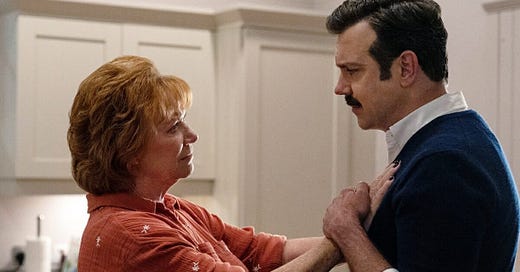



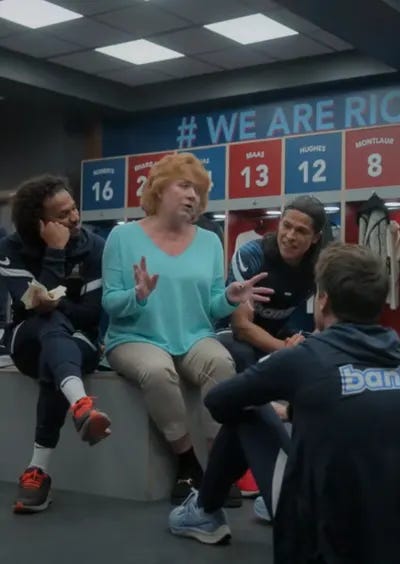
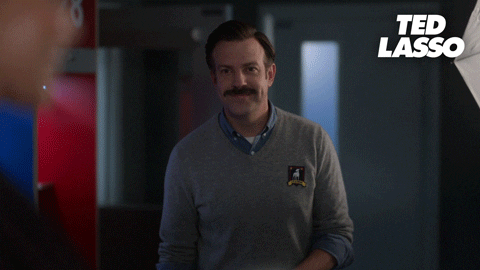
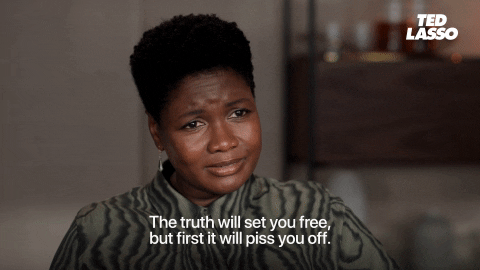
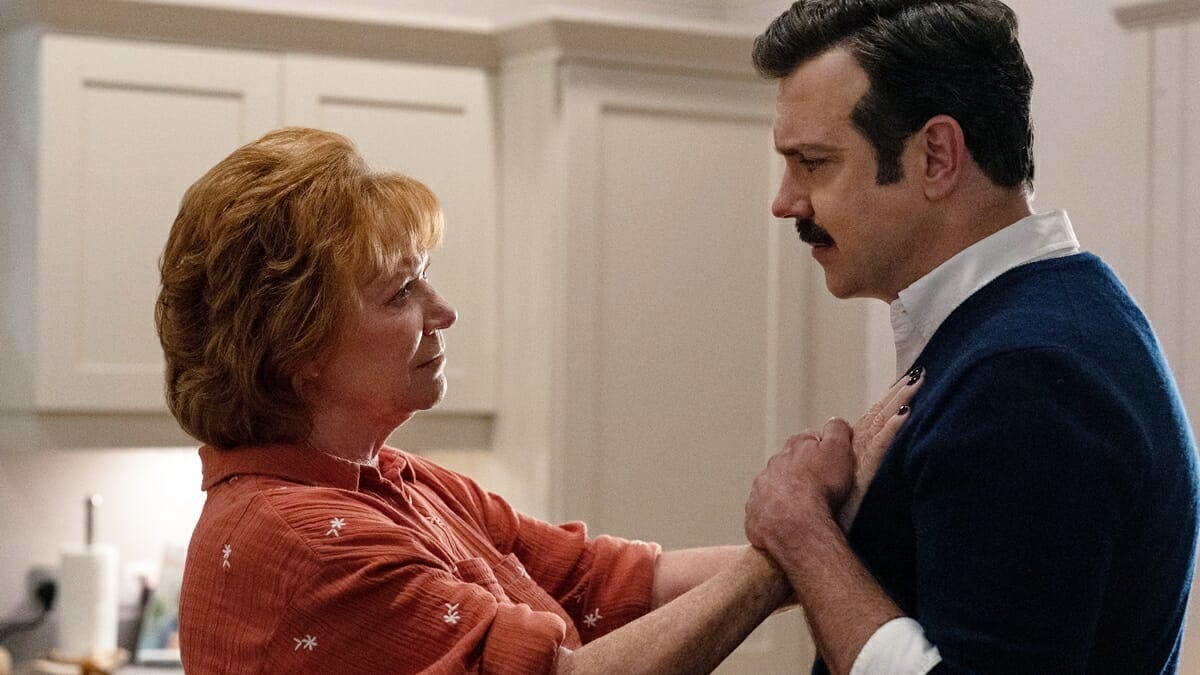
I loved when Ted told Dottie he saw a therapist and Dottie said, “Let me guess, it’s all my fault,” with a laugh. All the moms I know care so much about their kids, and feel so much guilt about how we fuck up, and also are constantly putting off our own self-care and growth to try to do the impossible: perfectly love someone we would die for. But there is no perfect. The very best we can do is learn how to communicate honestly, resolve conflict, and make amends. But hey, I even fucked that up. The only thing I have to say is that my mom did her best, and I still had wounds. And I did better than my mom, and my kids all have wounds. I am here for the thank yous and fuck yous whenever they are ready. I am still growing.
Great article